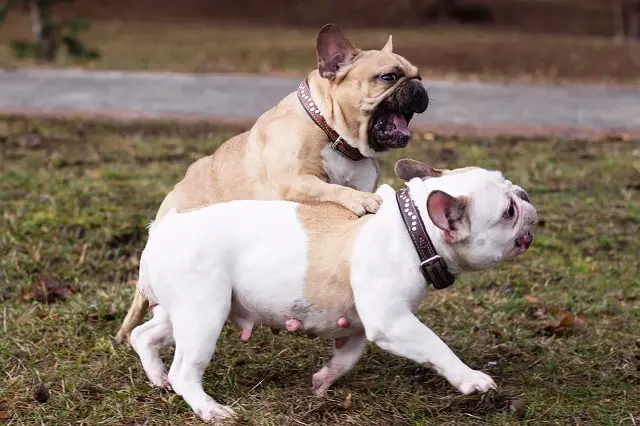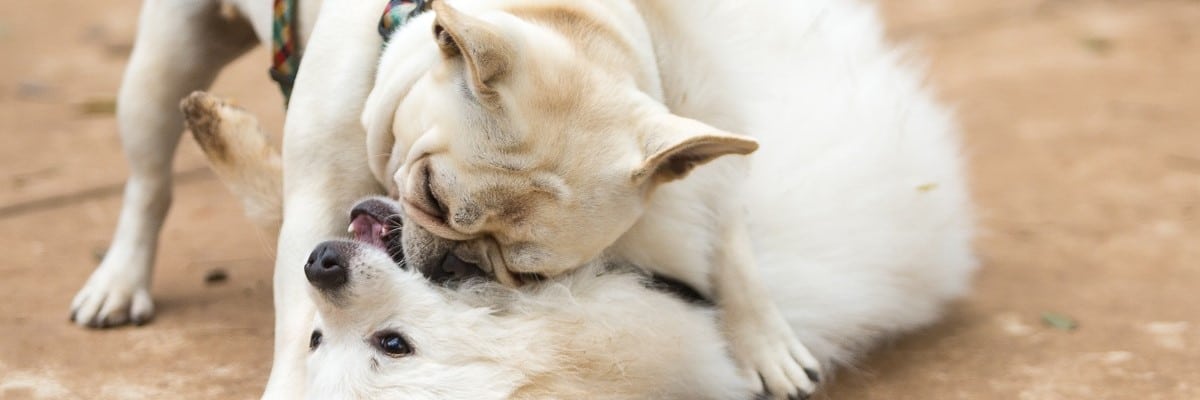My French Bulldog Is Aggressive To Other Dogs: Even though it can be embarrassing for owners, many people accept that some aggression between dogs that are unfamiliar with each other is inevitable, but this isn’t always the case. There are several reasons why your French Bulldog becomes aggressive toward other dogs, but it is important to remember that you can take steps to prevent it.
Is it normal for my French Bulldog to fight with dogs they have never met?
Like us, not all dogs are capable of interacting with members of their own species. A well-socialized dog is far less likely to exhibit aggression or physical conflict. Dogs can use body language to express their willingness to interact and avoid confrontation.
Dogs can cause injury to one another and people attempting to pull them apart. Dogs can be aggressive toward other unfamiliar dogs out of fear, body language, defensive behavior, or territorial behavior because they are possessive of resources (such as other animals or family members). Your French Bulldog shows the following if they are behaving aggressively.
| Quick nip that leaves no mark | Growl Showing teeth becoming very still and rigid |
| Guttural bark that sounds threatening | Lunging forward or charging at the dog with no contact |
| Snarling | Bite with enough pressure to cause a bruised bite that causes a puncture. |
| Repeated bites in rapid succession | Sharp, quick bite that tears the skin |
Signs of fear or defensive aggression toward strange dogs?
Aggressive interactions with other dogs are typical signs of this type of aggression. When your French Bulldog learns that aggressive displays stop encounters, they are likely to develop more confidence in their body posture as their behavior becomes more intense. In the presence of another dog, your French Bulldog’s body language and reactions can be used to diagnose problems. Depending on the outcome of the interaction, your dog’s body language can change over time. As a result, it is important to take note of the current expressions and postures as well as those of the first few meetings.
Barking and lunging at the approaching dog simultaneously is common behavior. In many cases, it’s an attempt to avoid eye contact. Dogs that are afraid typically have their tails tucked, their ears pinned back, and may lean against their owners or try to hide behind them.
If your Frenchie is not socialized with other dogs sufficiently, it is unlikely to develop the necessary social skills to interact with others and interact comfortably with them playfully. The lack of control over a highly aroused dog can cause another dog to become scared or defensive, eventually leading to aggressive behavior from each dog. There is a possibility that this behavior is the result of previous aggressive attacks, in which your French Bulldog was injured and could not escape.
You often influence your Frencie behavior, the owner. You may signal tension by pulling the leash or by yelling “corrections,” for instance, to let your French Bulldog know that another dog or, at the very least, the situation is troubling. As a result, your French Bulldog perceives you as frustrated, anxious, or worried about the other dog’s behavior. You Frenchie may associate your reactions with those of the other dog. This may cause your French Bulldog to become even more aggressive and defensive.
Trying to calm down your French Bulldog may reinforce your Frenchie’s behavior at the time. On the other hand, you will only heighten your French Bulldog’s fear and anxiety concerning the stimulus if you threaten or punish your dog.
The dog will become highly defensive if your French Bulldog is restrained on a leash, particularly with a choker collar, and the owner has poor control. When restrained on a leash or tethered to a post, your Frenchies’ body language and reaction to another dog are more likely to present aggression because they can’t escape.

What does possessive aggression look like in my French Bulldog?
A French Bulldog that owns an item can display possessive aggression towards anyone approaching him. Finding food treats, toys with family members nearby or present is not unusual. Your French Bulldog may be in a problem if it is extremely protective of an item, especially when other dogs want it also, or if both dogs seem to be to fight to take or keep the resource. Your French Bulldog may occasionally show no signs of aggression unless they are surrounded by items (foods, toys), in which case removing the items should minimize aggression.
In most cases, dog aggression is aggravated by conditioning and learning. A common mistake is punishing the dog by displaying anger toward other dogs. Your Frenchie considers an act of aggression successful when it results in the other dog retreating (or being removed by its owner). You may be rewarding the aggressive behavior if you try to calm your French Bulldog.
As a result, the other dog is usually associated with unfortunate consequences, thus raising the dog’s level of aggression. Many owners try to gain more control by increasing the level or type of discipline, which sometimes triggers retaliation and makes your Frenchie defensive toward you. Initial use of these products suppresses undesirable behaviors that may cause consumers to become confused.
Although these techniques could work, it does not mean that they are effective since even when a response is stopped, negative associations may increase. If one dog or both dogs become hurt or injured during a dog-to-dog interaction, the dogs will become more fearful and aggressive in the future. When owners cannot effectively control their dog and stop the incident without increasing the dog’s anxiety, then the dog’s anxiety will increase with each time.
Little French Dog is a participant in the Amazon Services LLC Associates Program, an affiliate advertising program designed to provide a means for sites to earn advertising fees by advertising and linking to Amazon.com.
Recognize aggression caused by poor communication between dogs that are unfamiliar with each other?
The dog may act aggressively by using expressive gestures or postures. When a dog makes these gestures, it can place its head or feet on the back of the other dog or make other dominant body postures such as high tails or standing stiff-legged. Aggressive behavior may occur if either dog does not appease or submit appropriately to the other’s behavior.
Using threatening or disciplinary methods or tightening the leash may unintentionally heighten the dog’s anxiety and arousal. Your French Bulldog may interpret these as signals of impending danger. As a result of the leash restriction, your Frenchie cannot respond with all his body postures, approaches, and retreats.
Good communication will result in minimum fighting between familiar dogs, but this method might not work as well with unfamiliar dogs. It is possible that your French Bulldog will not understand the other dog’s signals and, in response, may openly display aggression, even when the other dog displays respectful behavior. This can lead to the other dog displaying defensive aggression.
Additionally, the circumstances and environments in which dogs are walked, behavioral genetics, inadequate socialization between dogs, and the abundance of differences between breeds and individuals can also contribute. Aggressive or overprotective dogs may become overaggressive if their owners are not controlling them verbally or physically. Aggressive dogs who are challenged may fight versus run away.
The dogs may be in conflict when they are friendly to each other or socially attracted but uncertain or fearful of what might happen. During these situations of conflict or uncertainty, they can become aggressive. During walks, a dog that pulls its owner along may react to stimuli along the way before looking for direction or reassurance from the owner.

How do I stop my dog from being aggressive with other dogs?
Puppies should be trained and socialized as soon as possible. Your French Bulldog will learn proper interactions and reactions with other dogs by being exposed to them early and often. In this way, aggressive behaviors can be prevented. There should be a variety of sizes, shapes, and personalities of other dogs for your French Bulldog to be socialized with. Depending on the size difference, it may not be easy to assess the position of the ears, eye contact, tail, and even the body posture of the dogs. In order to avoid escalating the situation, you must be able to control your Frenchie and stop the situation without aggravating their anxiety.
Your French Bulldog must be controlled at all times. Your Frenchie will therefore act calmly, less anxiously, and less protectively when faced with new situations due to taking context cues from you. Furthermore, your French Bulldog should be able to respond to commands such as sit and stay reliably so that the correct responses can be installed rather than punished. In situations where dogs are likely to encounter each other, they should be leashed. You might need to use a head halter to control your Frenchie further.
Territorial behavior can be addressed by preventing extended and out-of-control aggression inside and outside the home. Aggressive dogs bark, lunge, run over fences and jump on doors, windows, and fences. If necessary, block windows and take the dog outside to discourage these types of behaviors. You can improve control indoors and out by using a leash and muzzle collar, stopping aggressive behavior, and redirecting the dog to behave more appropriately. As part of your training program, ensure your dog learns the quiet command for barking.
Conclusion
A crucial aspect of treatment is behavioral modification. It is crucial to train dogs to sit and relax when given verbal cues and reward them with small food treats. It may also be helpful for you to gradually introduce the dog to other dogs in public in order to condition it not to be afraid of them. Inter-dog aggression cannot be treated with a licensed medication. Some low dosages of Serotonin Reuptake Inhibitors, Tricyclic Antidepressants, or Benzodiazepines may be prescribed if the behavior is mainly caused by fear or anxiety rather than a desire to establish dominance.
It is generally possible to measure the success of treating inter-dog aggression by examining the frequency or severity of incidents. A dog should also receive treatment recommendations for the remainder of its life. Unless you strictly follow the recommendations at all times, aggressive incidents can recur even if the owner has completely eliminated aggressive incidents for a time.

